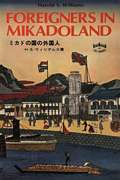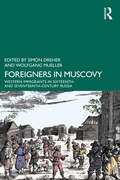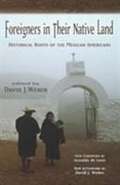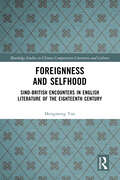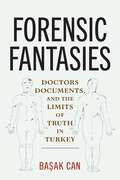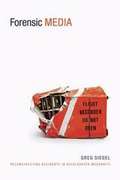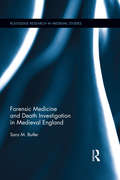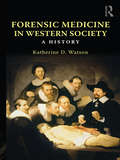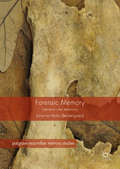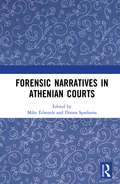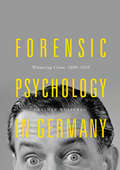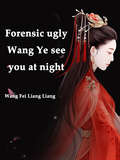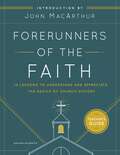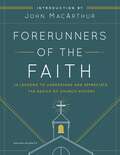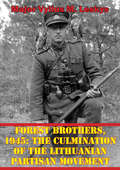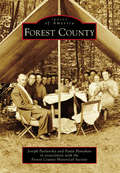- Table View
- List View
Foreigners in Mikadoland
by Harold S. WilliamsThis is an account of life in the foreign communities and former Foreign Settlements or Concessions in Japan that flourished after Japan was opened to foreign trade in 1859. It tells of the imposters, the eccentrics, and the scandals, no less than the achievements of the scholars, the merchants, and the diplomats who contributed so much to the development of modern Japan.Here you will meet Townsend Harris, the first U.S. Consul General to Japan, the Grand Duke Alexander, and many other less well known, but just as interesting figures such as the energetic Rev. Bailey, the remarkable Mr. McLeod, and the Misses Butterfly and Chrysanthemum.All these events are portrayed in a series of chapters, arranged as nearly as possible in chronological order, each woven around some of the happenings of those times. Carefully researched, all of these events are historically accurate in every detail, and are written in Mr. Williams' highly enjoyable style.
Foreigners in Mikadoland
by Harold S. WilliamsThis is an account of life in the foreign communities and former Foreign Settlements or Concessions in Japan that flourished after Japan was opened to foreign trade in 1859. It tells of the imposters, the eccentrics, and the scandals, no less than the achievements of the scholars, the merchants, and the diplomats who contributed so much to the development of modern Japan.Here you will meet Townsend Harris, the first U.S. Consul General to Japan, the Grand Duke Alexander, and many other less well known, but just as interesting figures such as the energetic Rev. Bailey, the remarkable Mr. McLeod, and the Misses Butterfly and Chrysanthemum.All these events are portrayed in a series of chapters, arranged as nearly as possible in chronological order, each woven around some of the happenings of those times. Carefully researched, all of these events are historically accurate in every detail, and are written in Mr. Williams' highly enjoyable style.
Foreigners in Muscovy: Western Immigrants in Sixteenth- and Seventeenth-Century Russia
by Wolfgang Mueller Simon DreherBetween the late fifteenth and early eighteenth centuries, the State of Muscovy emerged from being a rather homogenous Russian-speaking and Orthodox medieval principality to becoming a multi-ethnic and multi-religious empire. Not only the conquest of the neighbouring Tatar Khanates and the colonisation of Siberia demanded the integration of non-Christian populations into the Russian state. The ethnic composition of the capital and other towns also changed due to Muscovite policies of recruiting soldiers, officers, and specialists from various European countries, as well as the accommodation of merchants and the resettlement of war prisoners and civilians from annexed territories. The presence of foreign immigrants was accompanied by controversy and conflicts, which demanded adaptations not only in the Muscovite legal, fiscal, and economic systems but also in the everyday life of both native citizens and immigrants.This book combines two major research fields on international relations in the State of Muscovy: the migration, settlement, and integration of Western Europeans, and Russian and European perceptions of the respective "other".Foreigners in Muscovy will appeal to researchers and students interested in the history and social makeup of Muscovy and in European–Russian relations during the early modern era.
Foreigners in Their Native Land: Historical Roots of the Mexican Americans
by David J. WeberWhen Weber's (history, Southern Methodist U., Dallas) anthology of 50 Spanish, Mexican and American writings was first published in 1973, it represented a bold effort to develop systematically the documentary sources for Mexican American history. With this 13th paperbound printing, the 30th anniversary edition proves the text's lasting value and appeal. The latest edition includes a new foreword by Arnoldo de Leon (history, Angelo State U., Texas) discussing the contribution Weber's text made, and continues to make, to the field of Mexican American history, and a new afterword by Weber, looking back at the creation of the book and assessing its continuing scholarly relevance today. Annotation ©2004 Book News, Inc., Portland, OR (booknews.com)
Foreignness and Selfhood: Sino-British Encounters in English Literature of the Eighteenth Century (Routledge Studies in Chinese Comparative Literature and Culture)
by Mengmeng YanIn inviting a rethinking of ideas of foreignness and selfhood, this book explores Sino-British encounters in eighteenth-century English literature, providing detailed critical and literary analysis of individual texts pertaining to China from this period. The author provides a synthesis of approaches to China in eighteenth-century English literature, involving fictional writing related to China, adaptations of Chinese source texts, and translations of Chinese literary works. By discussing various writings about tea and tea-drinking, Arthur Murphy’s The Orphan of China (1759), Oliver Goldsmith’s The Citizen of the World (1760–62), and Thomas Percy’s Hau Kiou Choaan (1761), she highlights the significance of reading these texts not simply as documents of a historical kind, but as texts that are worthy of literary and artistic attention on the basis of their rich variety in genre, style, and themes. The author proposes that Chinese and British cultures are not antithetical entities: they exist in relation to one another and create possibilities in the continuing appreciation of diversity amidst a drive to universality. This study will be primarily helpful to university students and professors of English literature, comparative literature, and history worldwide.
Forensic Fantasies: Doctors, Documents, and the Limits of Truth in Turkey
by Başak CanHow progressive doctors, medical institutions, and state forces in Turkey use forensic methods to detect, erase, and reveal evidence of state violenceForensic Fantasies explores the role of medical documentation and evidence in uncovering human rights violations. Anthropologist Başak Can examines how progressive doctors, medical institutions, and state forces in Turkey use forensic methods to detect, erase, reveal, and transform violence exerted against populations deemed to be enemies of the state.Through extensive ethnographic fieldwork with doctors engaged in forensic documentation of torture, Can shows how the shared belief in the power of medical witnessing to establish truth and justice brings political activists and medical experts into community with each other; at the same time, this belief, or “forensic fantasy,” as Can terms it, can actually further entrench state power through its reliance on legal and administrative recognition of the violence it is seeking to document.Unpacking the epistemological frameworks, political histories, institutional and legal structures, professional networks, and daily practices that give rise to and sustain these forensic fantasies, Can exposes the possibilities and limits of radical documentation as a political project. Shedding new light on the tensions of our contemporary post-truth moment, Can demonstrates how forensic fantasies are vital for forming communities of experts who oppose regimes of denial and ignorance, but at the same time, have limited political efficacy in bringing about change and countering state violence.
Forensic Media: Reconstructing Accidents in Accelerated Modernity
by Greg SiegelIn Forensic Media, Greg Siegel considers how photographic, electronic, and digital media have been used to record and reconstruct accidents, particularly high-speed crashes and catastrophes. Focusing in turn on the birth of the field of forensic engineering, Charles Babbage's invention of a "self-registering apparatus" for railroad trains, flight-data and cockpit voice recorders ("black boxes"), the science of automobile crash-testing, and various accident-reconstruction techniques and technologies, Siegel shows how "forensic media" work to transmute disruptive chance occurrences into reassuring narratives of causal succession. Through historical and philosophical analyses, he demonstrates that forensic media are as much technologies of cultural imagination as they are instruments of scientific inscription, as imbued with ideological fantasies as they are compelled by institutional rationales. By rethinking the historical links and cultural relays between accidents and forensics, Siegel sheds new light on the corresponding connections between media, technology, and modernity.
Forensic Medicine and Death Investigation in Medieval England (Routledge Research in Medieval Studies #7)
by Sara M. ButlerEngland has traditionally been understood as a latecomer to the use of forensic medicine in death investigation, lagging nearly two-hundred years behind other European authorities. Using the coroner's inquest as a lens, this book hopes to offer a fresh perspective on the process of death investigation in medieval England. The central premise of this book is that medical practitioners did participate in death investigation – although not in every inquest, or even most, and not necessarily in those investigations where we today would deem their advice most pertinent. The medieval relationship with death and disease, in particular, shaped coroners' and their jurors' understanding of the inquest's medical needs and led them to conclusions that can only be understood in context of the medieval world's holistic approach to health and medicine. Moreover, while the English resisted Southern Europe's penchant for autopsies, at times their findings reveal a solid understanding of internal medicine. By studying cause of death in the coroners' reports, this study sheds new light on subjects such as abortion by assault, bubonic plague, cruentation, epilepsy, insanity, senescence, and unnatural death.
Forensic Medicine in Western Society: A History
by Katherine D. WatsonThe first book of its kind, Forensic Medicine in Western Society: A History draws on the most recent developments in the historiography, to provide an overview of the history of forensic medicine in the West from the medieval period to the present day. Taking an international, comparative perspective on the changing nature of the relationship between medicine, law and society, it examines the growth of medico-legal ideas, institutions and practices in Britain, Europe (principally France, Italy and Germany) and the United States. Following a thematic structure within a broad chronological framework, the book focuses on practitioners, the development of notions of ‘expertise’ and the rise of the expert, the main areas of the criminal law to which forensic medicine contributed, medical attitudes towards the victims and perpetrators of crime, and the wider influences such attitudes had. It thus develops an understanding of how medicine has played an active part in shaping legal, political and social change. Including case studies which provide a narrative context to tie forensic medicine to the societies in which it was practiced, and a further reading section at the end of each chapter, Katherine D. Watson creates a vivid portrait of a topic of relevance to social historians and students of the history of medicine, law and crime.
Forensic Memory
by Johanne Helbo BøndergaardThis book describes and analyses a particular literary mode that challenges the aesthetics of testimony by approaching the past through detection, analysis, and ‘archaeological’ digging. How does forensic literature narrate the past in terms of plot, language, narration, and use of visual media? This volume examines how forensic literature provides an important corrective to the forensic paradigm and a means of exploring the relationship between visual and material evidence and various forms of testimony. This literary engagement with the past is investigated in order to challenge a forensic paradigm that aims to eliminate the problems related to human testimony through scientific objectivity, resulting in a fresh and original text in which Bøndergaard argues literature’s potential to explore the mechanisms of representation, interpretation, and narration.
Forensic Narratives in Athenian Courts
by Mike Edwards Dimos SpatharasForensic Narratives in Athenian Courts breaks new ground by exploring different aspects of forensic storytelling in Athenian legal speeches and the ways in which forensic narratives reflect normative concerns and legal issues. The chapters, written by distinguished experts in Athenian oratory and society, explore the importance of narratives for the arguments of relatively underdiscussed orators such as Isaeus and Apollodorus. They employ new methods to investigate issues such as speeches’ deceptiveness or the appraisals which constitute the emotion scripts that speakers put together. This volume not only addresses a gap in the field of Athenian oratory, but also encourages comparative approaches to forensic narratives and fiction, and fresh investigations of the implications of forensic storytelling for other literary genres. Forensic Narratives in Athenian Courts will be an invaluable resource to students and researchers of Athenian oratory and their legal system, as well as those working on Greek society and literature more broadly.
Forensic Psychology in Germany
by Heather WolfframThis book examines the emergence and early development of forensic psychology in Germany from the late nineteenth century until the outbreak of the Second World War, highlighting the field’s interdisciplinary beginnings and contested evolution. Initially envisaged as a psychology of all those involved in criminal proceedings, this new discipline promised to move away from an exclusive focus on the criminal to provide a holistic view of how human fallibility impacted upon criminal justice. As this book argues, however, by the inter-war period, forensic psychology had largely become a psychology of the witness; its focus narrowed by the exigencies of the courtroom. Utilising detailed studies of the 1896 Berchtold trial and the 1930 Frenzel trial, the book asks whether the tensions between psychiatry, psychology, forensic medicine, pedagogy and law over psychological expertise were present in courtroom practice and considers why a clear winner in the “battle for forensic psychology” had yet to emerge by 1939.
Forensic Seismology and Nuclear Test Bans
by Alan DouglasWith the signing in 1996 of the Comprehensive Nuclear Test Ban Treaty, interest has grown in forensic seismology: the application of seismology to nuclear test ban verification. This book, based on over 50 years of experience in forensic seismology research, charts the development of methods of seismic data analysis. Topics covered include: the estimation of seismic magnitudes, travel-time tables and epicentres; seismic signal processing; and the use of seismometer arrays. Fully illustrated with seismograms from explosions and earthquakes, the book demonstrates methods and problems of visual analysis. Each chapter provides exercises to help the reader familiarise themselves with practical issues in the field of forensic seismology, and figures and solutions to exercises are also available online. The book is a key reference work for academic researchers and specialists in the area of forensic seismology and Earth structure, and will also be valuable to postgraduates in seismology and solid earth geophysics.
Forensic ugly: Volume 1 (Volume 1 #1)
by Wang FeiLiangLiangThe female medical examiner of the 21st century had provoked a handsome man as soon as she teleported.Not only did he jump into a murder mystery, but he was also ugly enough to shock the world and make the gods cry.His birth father didn't like it, his sisters were hypocritical, and the crown prince ruined the marriage!What could he do? Of course it was to go back to the old ways and live on!This infuriated him to death. He tore apart the white lotuses with his hands, kicked out the dregs with his feet, broke through all the mysteries, and from then on, ascended to the peak of his life.Hey, what's going on with that devilish man?He despised her figure! They despised her for being ugly!But it would always come!She angrily roared at him, "Scram! I don't need a man in my world!"
Forensic ugly: Volume 2 (Volume 2 #2)
by Wang FeiLiangLiangThe female medical examiner of the 21st century had provoked a handsome man as soon as she teleported.Not only did he jump into a murder mystery, but he was also ugly enough to shock the world and make the gods cry.His birth father didn't like it, his sisters were hypocritical, and the crown prince ruined the marriage!What could he do? Of course it was to go back to the old ways and live on!This infuriated him to death. He tore apart the white lotuses with his hands, kicked out the dregs with his feet, broke through all the mysteries, and from then on, ascended to the peak of his life.Hey, what's going on with that devilish man?He despised her figure! They despised her for being ugly!But it would always come!She angrily roared at him, "Scram! I don't need a man in my world!"
Forensic ugly: Volume 3 (Volume 3 #3)
by Wang FeiLiangLiangThe female medical examiner of the 21st century had provoked a handsome man as soon as she teleported.Not only did he jump into a murder mystery, but he was also ugly enough to shock the world and make the gods cry.His birth father didn't like it, his sisters were hypocritical, and the crown prince ruined the marriage!What could he do? Of course it was to go back to the old ways and live on!This infuriated him to death. He tore apart the white lotuses with his hands, kicked out the dregs with his feet, broke through all the mysteries, and from then on, ascended to the peak of his life.Hey, what's going on with that devilish man?He despised her figure! They despised her for being ugly!But it would always come!She angrily roared at him, "Scram! I don't need a man in my world!"
Forensic ugly: Volume 4 (Volume 4 #4)
by Wang FeiLiangLiangThe female medical examiner of the 21st century had provoked a handsome man as soon as she teleported.Not only did he jump into a murder mystery, but he was also ugly enough to shock the world and make the gods cry.His birth father didn't like it, his sisters were hypocritical, and the crown prince ruined the marriage!What could he do? Of course it was to go back to the old ways and live on!This infuriated him to death. He tore apart the white lotuses with his hands, kicked out the dregs with his feet, broke through all the mysteries, and from then on, ascended to the peak of his life.Hey, what's going on with that devilish man?He despised her figure! They despised her for being ugly!But it would always come!She angrily roared at him, "Scram! I don't need a man in my world!"
Forensic ugly: Volume 5 (Volume 5 #5)
by Wang FeiLiangLiangThe female medical examiner of the 21st century had provoked a handsome man as soon as she teleported.Not only did he jump into a murder mystery, but he was also ugly enough to shock the world and make the gods cry.His birth father didn't like it, his sisters were hypocritical, and the crown prince ruined the marriage!What could he do? Of course it was to go back to the old ways and live on!This infuriated him to death. He tore apart the white lotuses with his hands, kicked out the dregs with his feet, broke through all the mysteries, and from then on, ascended to the peak of his life.Hey, what's going on with that devilish man?He despised her figure! They despised her for being ugly!But it would always come!She angrily roared at him, "Scram! I don't need a man in my world!"
Forensische Psychologie in Deutschland: Zeugenschaft des Verbrechens, 1880-1939
by Heather WolfframDieses Buch untersucht die Entstehung und frühe Entwicklung der forensischen Psychologie in Deutschland vom späten neunzehnten Jahrhundert bis zum Ausbruch des Zweiten Weltkriegs und beleuchtet die interdisziplinären Anfänge und die umstrittene Entwicklung des Fachs. Ursprünglich als Psychologie aller an Strafverfahren Beteiligten gedacht, versprach diese neue Disziplin, sich von der ausschließlichen Konzentration auf den Kriminellen zu lösen und eine ganzheitliche Sichtweise der Auswirkungen menschlicher Fehlbarkeit auf die Strafjustiz zu bieten. Wie in diesem Buch dargelegt wird, war die forensische Psychologie in der Zwischenkriegszeit jedoch weitgehend zu einer Psychologie des Zeugen geworden; ihr Fokus wurde durch die Anforderungen des Gerichtssaals eingeengt. Anhand detaillierter Studien des Berchtold-Prozesses von 1896 und des Frenzel-Prozesses von 1930 geht das Buch der Frage nach, ob die Spannungen zwischen Psychiatrie, Psychologie, Gerichtsmedizin, Pädagogik und Recht in Bezug auf psychologisches Fachwissen in der Gerichtspraxis präsent waren, und untersucht, warum sich bis 1939 noch kein klarer Sieger im "Kampf um die forensische Psychologie" abzeichnete.
Forerunners of the Faith Teacher's Guide: 13 Lessons to Understand and Appreciate the Basics of Church History
by Nathan BusenitzEnter God&’s Story of Faithfulness to His PeopleThe Christian faith extends beyond our personal experiences, our individual churches, and far beyond our present age. This, for the Christian, is great news. When we become acquainted with the legacy of our Christian heritage, we connect our stories to those of the faithful believers who have come before us. This connection is precisely what Nathan Busenitz, Dean of Faculty and professor of church history at The Master's Seminary, seeks to provide. Based on the bestselling Fundamentals of the Faith, Forerunners of the Faith outlines the biblical orthodoxy that characterizes the true church. Busenitz succinctly identifies thirteen key lessons that capture the trials and triumphs of the historical Church, providing insights for how the ancient Christians responded to the problems of their day to become the pillars of faith we now consider them to be. Learn how your faith stands on the shoulders of giants like Athanasius, Augustine, and Wycliffe. As more than a didactic resource, Forerunners of the Faith serves as spiritual encouragement as we remember the legacy of God&’s faithfulness to his people.
Forerunners of the Faith Teacher's Guide: 13 Lessons to Understand and Appreciate the Basics of Church History
by Nathan BusenitzEnter God&’s Story of Faithfulness to His PeopleThe Christian faith extends beyond our personal experiences, our individual churches, and far beyond our present age. This, for the Christian, is great news. When we become acquainted with the legacy of our Christian heritage, we connect our stories to those of the faithful believers who have come before us. This connection is precisely what Nathan Busenitz, Dean of Faculty and professor of church history at The Master's Seminary, seeks to provide. Based on the bestselling Fundamentals of the Faith, Forerunners of the Faith outlines the biblical orthodoxy that characterizes the true church. Busenitz succinctly identifies thirteen key lessons that capture the trials and triumphs of the historical Church, providing insights for how the ancient Christians responded to the problems of their day to become the pillars of faith we now consider them to be. Learn how your faith stands on the shoulders of giants like Athanasius, Augustine, and Wycliffe. As more than a didactic resource, Forerunners of the Faith serves as spiritual encouragement as we remember the legacy of God&’s faithfulness to his people.
Forerunners of the Faith: 13 Lessons to Understand and Appreciate the Basics of Church History
by Nathan BusenitzEnter God&’s Story of Faithfulness to His PeopleThe Christian faith extends beyond our personal experiences, our individual churches, and far beyond our present age. This, for the Christian, is great news. When we become acquainted with the legacy of our Christian heritage, we connect our stories to those of the faithful believers who have come before us. This connection is precisely what Nathan Busenitz, Dean of Faculty and professor of church history at The Master's Seminary, seeks to provide. Based on the bestselling Fundamentals of the Faith, Forerunners of the Faith outlines the biblical orthodoxy that characterizes the true church. Busenitz then succinctly identifies thirteen key lessons that capture the trials and triumphs of the historical Church, providing insights for how the ancient Christians responded to the problems of their day to become the pillars of faith we now consider them to be. Learn how your faith stands on the shoulders of giants like Athanasius, Augustine, and Wycliffe. As more than a didactic resource, Forerunners of the Faith serves as spiritual encouragement as we remember the legacy of God&’s faithfulness to his people.Using this teaching guide, become empowered and equipped to lead your group through Forerunners of the Faith. Find answers to every lesson and insightful teaching notes.
Forerunners of the Faith: 13 Lessons to Understand and Appreciate the Basics of Church History
by Nathan BusenitzEnter God&’s Story of Faithfulness to His PeopleThe Christian faith extends beyond our personal experiences, our individual churches, and far beyond our present age. This, for the Christian, is great news. When we become acquainted with the legacy of our Christian heritage, we connect our stories to those of the faithful believers who have come before us. This connection is precisely what Nathan Busenitz, Dean of Faculty and professor of church history at The Master's Seminary, seeks to provide. Based on the bestselling Fundamentals of the Faith, Forerunners of the Faith outlines the biblical orthodoxy that characterizes the true church. Busenitz then succinctly identifies thirteen key lessons that capture the trials and triumphs of the historical Church, providing insights for how the ancient Christians responded to the problems of their day to become the pillars of faith we now consider them to be. Learn how your faith stands on the shoulders of giants like Athanasius, Augustine, and Wycliffe. As more than a didactic resource, Forerunners of the Faith serves as spiritual encouragement as we remember the legacy of God&’s faithfulness to his people.Using this teaching guide, become empowered and equipped to lead your group through Forerunners of the Faith. Find answers to every lesson and insightful teaching notes.
Forest Brothers, 1945: The Culmination Of The Lithuanian Partisan Movement
by Major Vylius M. LeskysAlthough the resistance effort maintained its strength ideologically, the Lithuanian partisan movement never recovered from the culminating point in 1945 because of a shortfall in resources, a lack of external support, and the inability of resistance leadership to adapt rapidly enough against a comprehensive Soviet assimilation campaign.While many authors argue that the high point in the Lithuanian partisan war occurred between 1946 and 1947, the totality of evidence points towards a culmination in 1945 from which the effort never recovered. This culminating point may be attributed to a miscalculation of partisan resources on the part of their leadership as well as a lack of external support. The main reason for achieving culmination, however, rested in the inability of partisans to fight a conventional war against a massive, combined arms Soviet force. Mass deportations between three separate occupations and a wave of 60,000 escapees created a vacuum of political, military and moral leadership. Compounded with the realization that there would be no external support from the democratic West, the will of the Lithuanians was bent by the Soviet campaign. Ultimately, the numbers of partisans killed, captured or given amnesty by Soviet forces reflect an apex in military capability in 1945 that drastically diminished thereafter.The pinnacle of partisan effort in 1945 clearly represents a culminating point that forced the Lithuanian resistance movement to shift their operations drastically. Ultimately, based on the totality of evidence, the 1945 culminating point splits the resistance into two stages: 1) 1944-1945-conventional war operations, a period of traditional offensive warfare by an organized partisan movement; and 2) 1946-1953-irregular warfare operations, a period of unremitting decline by a significantly diminished resistance, relegated to a more defensive posture and small scale offensive operations.
Forest County (Images of America)
by Joseph Pavlansky Paula Hanahan The Forest County Historical SocietyLocated within the western lands of Pennsylvania’s vast wilderness and rolling mountains, Forest County is known for its natural beauty and industrial history. With the Allegheny National Forest dominating the locale, Forest County is the third least populated county in Pennsylvania. Being recognized as an excellent place for outdoor adventures, the county is also known for its simplicity and for not having one traffic light within its boundaries. Over time, many have come to Forest County seeking opportunity and prosperity. When the surrounding counties were experiencing an oil boom, Forest County was exploring the lumber industry and dominating the business. To the hunters and fisherman that settled in Forest County, the wilderness was a utopia ripe with panther, deer, bear, wolves, bass, salmon, trout, and pike. The area is still revered for its vast wilds, which lend themselves to various recreational activities throughout the year.
